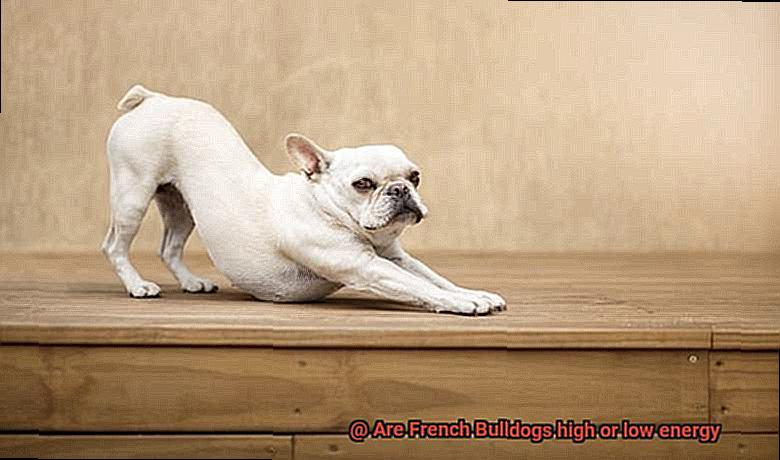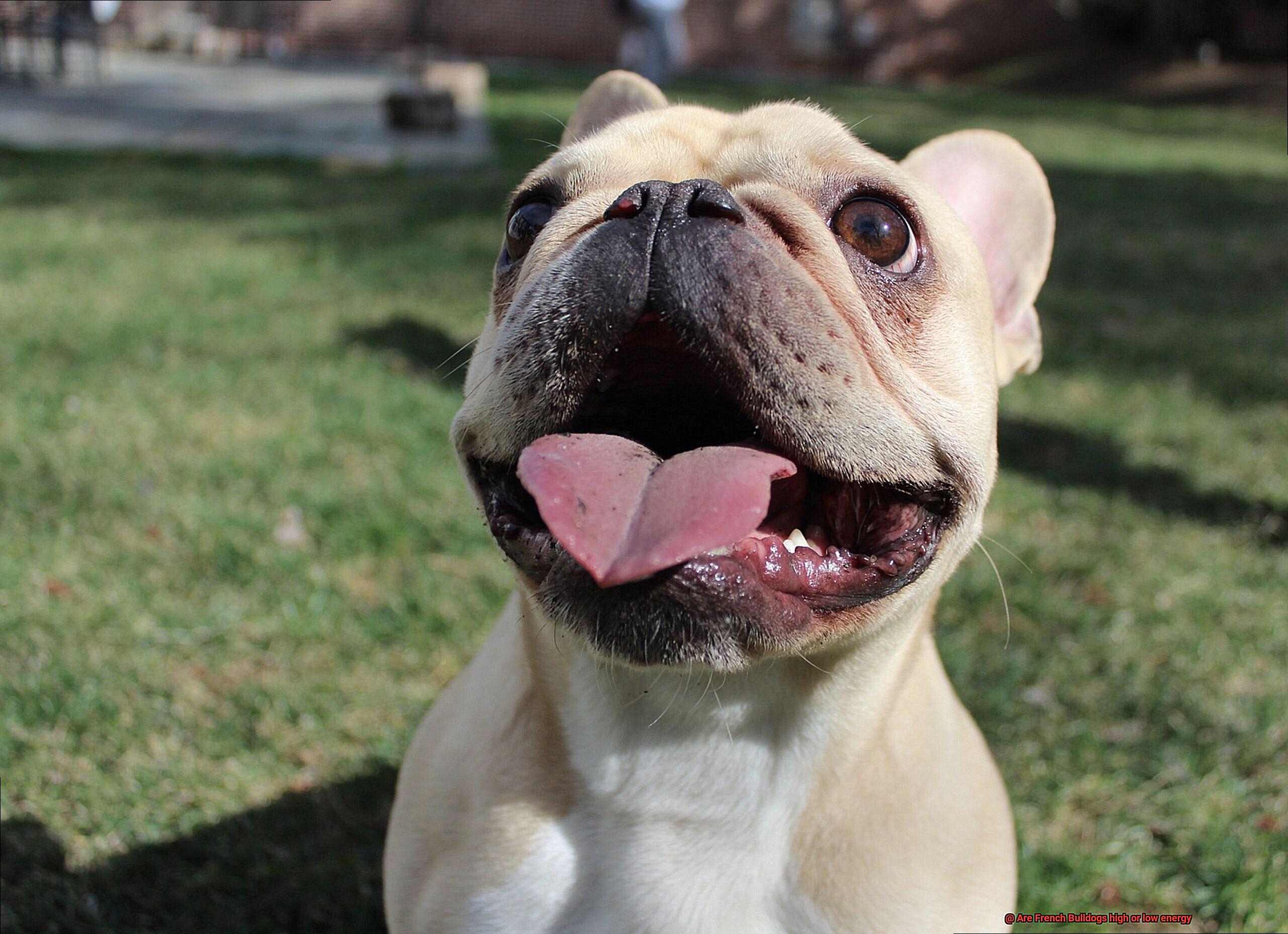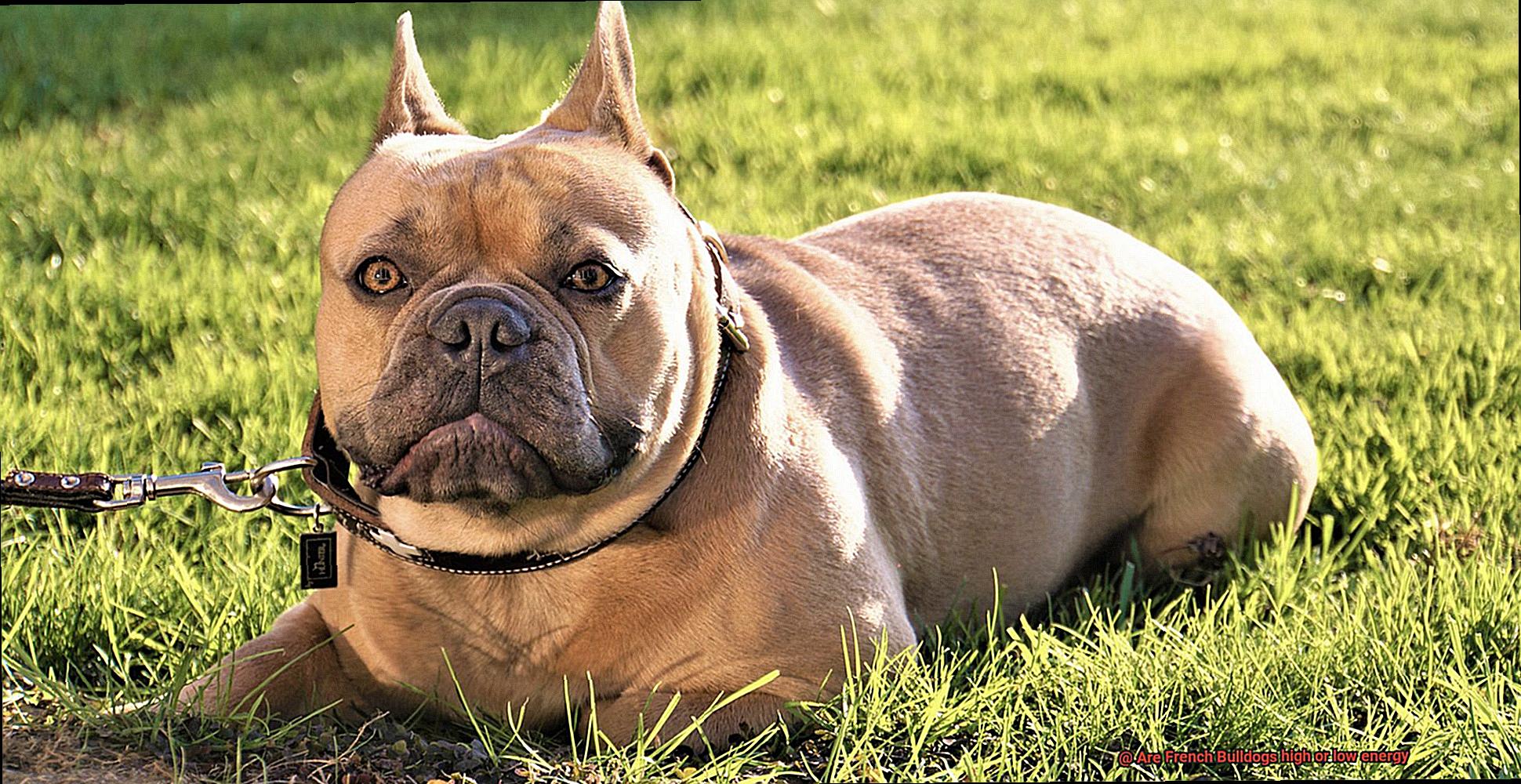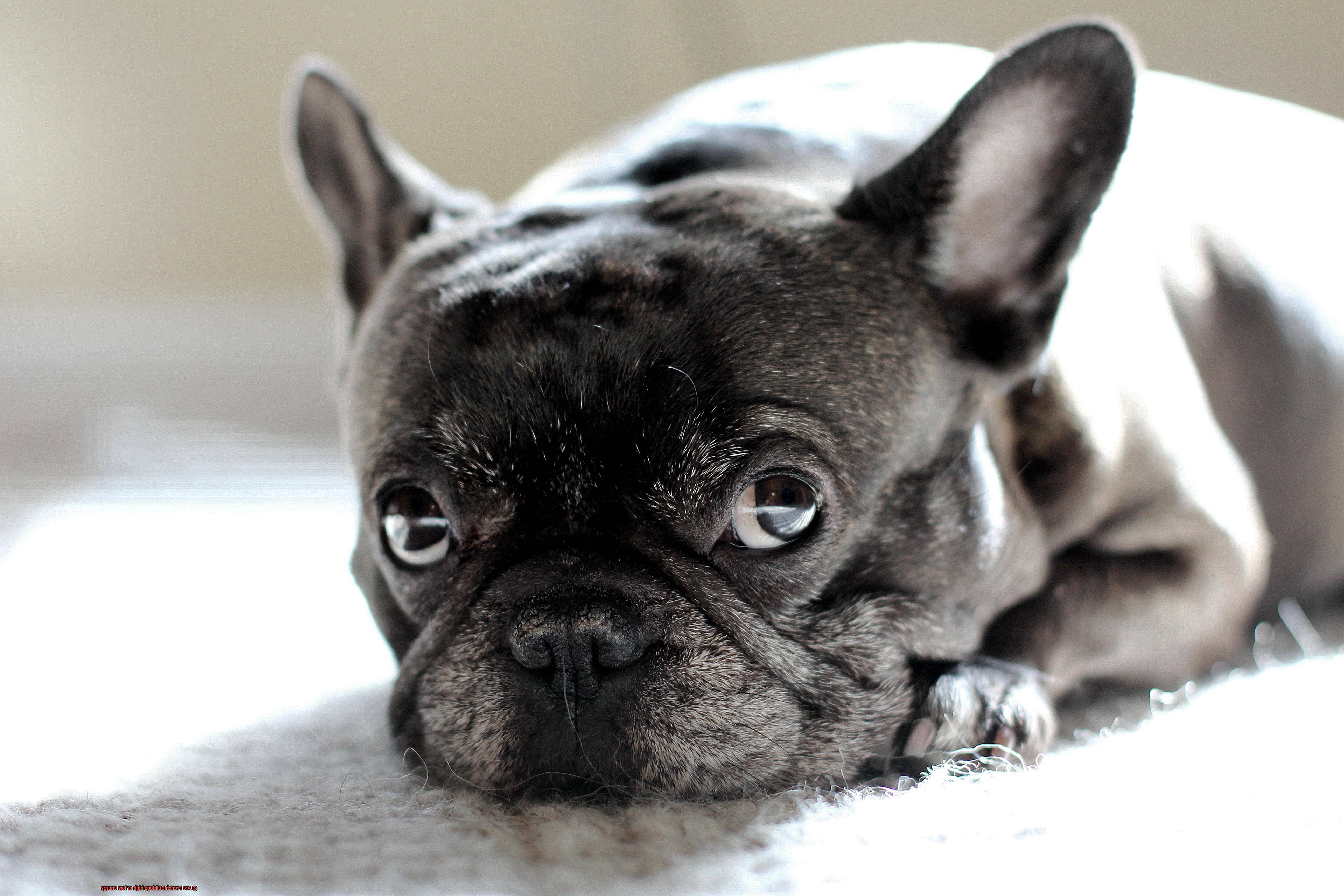Are French Bulldogs high or low energy?
Ready to dive into the world of French Bulldogs and their energy levels? We know you’re itching to find out if these adorable little pups are high or low energy.
Well, get ready for a twist because it’s not as simple as black or white. French Bulldogs have a reputation for being low energy, but don’t be fooled – they can still surprise you with bursts of zoomies.
In this post, we’ll dig deep into what makes these furry friends tick and help you figure out if their energy matches your lifestyle. So whether you’re a thrill-seeking adventurer or a self-proclaimed couch potato, keep reading to see if a French Bulldog is the perfect fit for your energy level.
Let’s get started.
Contents
- 1 Anatomy of French Bulldogs and Its Impact on Their Energy Levels
- 2 The Necessity of Exercise for French Bulldogs
- 3 Mental Stimulation and its Importance for French Bulldogs
- 4 Why Are French Bulldogs Often Described as Low Energy Dogs?
- 5 How to Create a Balanced Exercise Routine for Your French Bulldog
- 6 Tips for Meeting Your French Bulldog’s Exercise Needs
- 7 Signs of Overexertion in French Bulldogs
- 8 Conclusion
Anatomy of French Bulldogs and Its Impact on Their Energy Levels
While they may not be known for their high energy levels, understanding the impact of their unique anatomy on their energy levels is crucial for providing them with the right care and lifestyle. In this article, we will delve into the fascinating world of French Bulldog anatomy and explore how it influences their energy levels.
The Brachycephalic Skull Shape:
French Bulldogs’ signature short and pushed-in faces are not just cute, but they also play a significant role in their energy levels. This brachycephalic skull shape affects their breathing efficiency, making physical activities more challenging for them. The shortened muzzle can lead to narrow airways and obstructed breathing, causing fatigue and reduced stamina during exercise.
Compact and Muscular Body Structure:
While French Bulldogs may appear muscular and robust, their compact body structure can limit their physical abilities. Engaging in activities requiring agility or prolonged exertion may be more difficult for them. However, regular exercise is still essential to maintain their overall health and prevent weight gain.
Short Legs:

French Bulldogs’ relatively short legs can impact their ability to engage in high-intensity exercises or long-distance running. Their endurance may not match that of breeds with longer limbs. Instead, they excel in short bursts of activity, making them ideal companions for walks or play sessions that match their energy levels.
Individual Variations:
While French Bulldogs generally have a low to moderate energy level due to their anatomy, it’s important to remember that each dog is unique. Factors such as genetics, health conditions, and overall fitness can influence an individual dog’s energy levels within the breed.

Balancing Exercise and Rest:
To ensure the well-being of your French Bulldog, it’s crucial to strike a balance between providing adequate exercise and allowing them to rest. Overexertion or exposure to extreme temperatures can be harmful to their compromised respiratory system. Regular breaks during physical activities are recommended to allow them to catch their breath and avoid exhaustion.

The Necessity of Exercise for French Bulldogs
French Bulldogs may be known for their calm and laid-back temperament, but that doesn’t mean they don’t need exercise. In fact, regular physical activity is essential for their overall well-being.
Here, we will delve into the importance of exercise for French Bulldogs and provide you with valuable insights to keep your Frenchie happy and healthy.
Understanding the Unique Exercise Needs of French Bulldogs:
While French Bulldogs are generally considered low-energy dogs, it’s important to remember that every dog is unique. Some Frenchies may have higher energy levels and require more exercise. Tailoring the exercise routine to your individual dog’s needs is key.
Benefits of Exercise for French Bulldogs:
- Maintaining Physical Fitness: Regular exercise helps keep your Frenchie physically fit and maintains a healthy weight. This is crucial as obesity can lead to various health issues, including joint problems and heart disease.
- Mental Stimulation: Exercise provides mental stimulation for your Frenchie, keeping their minds sharp and reducing boredom or destructive behavior. Engage them in playtime activities or provide puzzle toys to keep their brains active.
- Preventing Behavioral Problems: A lack of exercise can contribute to behavioral problems such as excessive barking, chewing, or digging. Providing appropriate physical activity outlets helps curb these unwanted behaviors.

Designing an Effective Exercise Routine:
To create an exercise routine that suits your Frenchie’s needs, consider the following:
- Variety: Incorporate a mix of physical activities like walks, playtime, and mental stimulation through training sessions or puzzle toys.
- Individual Needs: Take into account your Frenchie’s age, health condition, and any specific restrictions or limitations they may have when designing their exercise routine. Consulting with your veterinarian can help ensure you’re meeting their unique needs.
- Brachycephalic Considerations: French Bulldogs have shortened snouts, making them more prone to overheating and respiratory issues. Avoid exercising them in extreme heat or humidity and provide ample breaks for rest and water during physical activity.
Mental Stimulation and its Importance for French Bulldogs
Mental stimulation refers to activities and exercises that engage a dog’s mind and cognitive abilities. Just like physical exercise, mental stimulation is crucial for their overall well-being. In this section, we will explore the importance of mental stimulation for French Bulldogs and how it can help prevent boredom, anxiety, and destructive behaviors.
Preventing Boredom

French Bulldogs are intelligent dogs and enjoy mental challenges. Engaging their minds helps keep them sharp and prevents them from getting bored.
When bored, French Bulldogs may resort to destructive behaviors such as excessive barking, digging, chewing, or even aggression in some cases.

Providing them with mental stimulation keeps their minds occupied and prevents them from seeking out destructive outlets.
Reducing Anxiety
Anxiety is a common issue among French Bulldogs. It can manifest in various ways such as excessive barking, pacing, or destructive behaviors. Mental stimulation helps redirect their focus and provides a healthy outlet for their energy.

By engaging their minds, we can help alleviate anxiety symptoms and create a sense of calm for our furry friends.
Preventing Destructive Behaviors
Lack of mental stimulation can lead to behavioral issues in French Bulldogs. When they don’t have an outlet for their energy and intelligence, they may resort to destructive behaviors to entertain themselves.
Providing mental stimulation through interactive toys, puzzles, treat-dispensing toys, and training sessions helps channel their energy into positive activities and prevents destructive behaviors.
Tips for Mental Stimulation
There are various ways to provide mental stimulation for French Bulldogs. Here are some tips:

- Interactive Toys: Invest in toys that require problem-solving skills or reward your French Bulldog’s efforts with treats.
- Puzzles: Introduce puzzle toys that challenge their minds and require problem-solving skills to receive a reward.
- Training Sessions: Engage in regular training sessions to teach them new commands or tricks. This not only stimulates their minds but also strengthens the bond between you and your furry companion.
- Variety in Routine: Add variety to your French Bulldog’s daily routine. Go on different routes during walks or introduce new environments to stimulate their senses and keep them mentally engaged.
- Balanced Exercise: Mental stimulation should be balanced with physical exercise. While French Bulldogs may not require as much exercise as some other breeds, they still benefit from daily walks or playtime to expend energy.
- Mealtime Engagement: Instead of feeding your French Bulldog from a regular bowl, consider using food puzzles or slow-feeders to make mealtime more engaging and mentally stimulating.
- Quality Time: Spending quality time with your French Bulldog, whether it’s through playtime or cuddling, is essential for their mental well-being. They thrive on human interaction and being part of the family.

Why Are French Bulldogs Often Described as Low Energy Dogs?
Here, we’ll dive deeper into the factors that contribute to their low energy levels and shed some light on this intriguing canine trait.
The Physical Build:
Let’s start with the physical build of French Bulldogs. With their compact and muscular bodies, they may not be built for marathons or intense physical activities. Their short legs and stocky stature can limit their endurance and make them more inclined towards leisurely strolls rather than vigorous exercise.
Brachycephalic Breeds:
French Bulldogs fall into the category of brachycephalic breeds, which means they have short muzzles. While this feature adds to their charm, it can also lead to breathing difficulties and reduced oxygen intake during exercise. These challenges can make them tire more quickly and prefer a slower-paced lifestyle.
Exercise Requirements:
While all dogs need regular exercise to stay healthy, French Bulldogs have relatively low exercise requirements compared to more energetic breeds. They are content with moderate activity levels and enjoy shorter walks or play sessions. This makes them an ideal choice for individuals or families with a less active lifestyle.
Temperament:
French Bulldogs have a laid-back and easygoing temperament that contributes to their low energy levels. They are happy to spend quality time indoors, snuggling up with their owners rather than engaging in high-energy play. This calm demeanor makes them excellent companions for apartment living or homes with limited space.
How to Create a Balanced Exercise Routine for Your French Bulldog
French Bulldogs are known for their adorable looks and affectionate nature. Despite their low to moderate energy levels, it is vital to provide them with regular exercise to maintain their physical and mental well-being. In this blog post, we will guide you through creating a balanced exercise routine that suits your French Bulldog’s individual needs and limitations.
Assessing Your Frenchie’s Energy Levels:
Understand that each French Bulldog is unique, so it’s essential to assess your dog’s energy levels. While they may not have as much energy as some other breeds, they still require daily exercise to stay healthy and happy.
Physical Exercise:
Include at least 30 minutes to an hour of physical activity in your French Bulldog’s routine each day. This can involve daily walks, playtime in a secure yard, or gentle games. Remember that Frenchies have compromised breathing systems, so avoid intense activities in hot or humid weather.
Mental Stimulation:
Incorporate activities that challenge your Frenchie’s mind to prevent boredom and destructive behaviors. Puzzle toys, obedience training, or scent games can keep their brains active and engaged.
Tailoring the Routine:
Consider your Frenchie’s age, health condition, and personal preferences when designing their exercise routine. Puppies may have shorter bursts of energy and require more frequent playtime, while older dogs may benefit from low-impact exercises like swimming or gentle walks.
Consult with Your Veterinarian:
Before starting any new exercise program, consult with your veterinarian. They can provide specific recommendations based on your Frenchie’s health status and any underlying conditions they may have.

Rest and Recovery:
Remember that rest and recovery are just as important as exercise. Allow your Frenchie plenty of time to rest between exercise sessions to prevent exhaustion or injury.
Tips for Meeting Your French Bulldog’s Exercise Needs
French Bulldogs are known for their charming personalities and low to moderate energy levels. While they may not require intense exercise, regular physical activity and mental stimulation are still essential for their overall well-being.
In this blog post, we will discuss tips for meeting your French Bulldog’s exercise needs, taking into account their unique characteristics and limitations.
Daily Walks:
Incorporating daily walks into your French Bulldog’s routine is a great way to provide them with both physical exercise and mental stimulation. Aim for at least two 30-minute walks per day, adjusting the duration based on your dog’s individual needs.

Walking not only helps maintain a healthy weight but also allows them to explore their surroundings and engage their senses.
Playtime:
Engaging in interactive games with your French Bulldog can help keep them active and mentally engaged. Games like fetch or hide-and-seek not only provide physical exercise but also strengthen the bond between you and your furry friend.
Additionally, puzzle toys or treat-dispensing toys can challenge their minds while rewarding them with treats, keeping them entertained and mentally stimulated.
Swimming:
Swimming is an excellent exercise option for French Bulldogs, as it provides a full-body workout without putting strain on their joints. However, it’s important to ensure proper supervision and safety measures when allowing your dog to swim.
Keep in mind that French Bulldogs are prone to overheating due to their short noses, so swimming should be done in shaded areas and during cooler parts of the day.
Exercise During Cooler Times:
Due to their brachycephalic anatomy, French Bulldogs are more susceptible to heat exhaustion and respiratory issues. To prevent overheating, it’s best to exercise them during cooler times of the day, such as early morning or evening. Choose shaded areas for outdoor activities and always provide plenty of fresh water to keep them hydrated.
Mental Stimulation:
In addition to physical exercise, it’s important to provide mental stimulation for your French Bulldog. Incorporate training sessions into their daily routine, teaching them commands and tricks that challenge their minds. Puzzle toys or food-dispensing toys can also provide mental stimulation while rewarding them with treats.
Signs of Overexertion in French Bulldogs
French Bulldogs are adorable and energetic little dogs that require regular exercise to keep them happy and healthy. However, it’s important to be aware of the signs of overexertion in French Bulldogs to ensure their well-being.
As an expert on this topic, I’m here to provide you with valuable information on how to recognize when your Frenchie has pushed themselves too hard.
- Excessive Panting: French Bulldogs have a short snout, which makes it difficult for them to regulate their body temperature efficiently. If you notice your Frenchie panting excessively and struggling to catch their breath even after rest, it could be a sign that they have overexerted themselves.
- Excessive Fatigue or Lethargy: If your usually energetic and playful French Bulldog suddenly becomes tired and uninterested in activities they usually enjoy, it may indicate that they have pushed themselves too hard.
- Muscle Stiffness and Soreness: Just like humans, dogs can experience muscle stiffness and soreness after intense physical activity. If your Frenchie seems to be experiencing discomfort or pain when moving, especially after vigorous exercise, it is essential to give them some rest and allow their muscles to recover.
- Vomiting or Diarrhea: The stress on their body and digestive system can lead to gastrointestinal issues. If your Frenchie exhibits these symptoms after intense exercise, it is crucial to provide them with plenty of water and monitor their condition closely.
- Heat Stroke: This is a severe consequence of overexertion, especially in French Bulldogs. These dogs are prone to overheating due to their brachycephalic (short-snouted) nature. Symptoms of heat stroke include excessive drooling, rapid breathing, weakness or collapse, and even seizures. If you suspect your Frenchie is suffering from heat stroke, it is crucial to seek immediate veterinary attention.
Prevention is key when it comes to avoiding overexertion in French Bulldogs. It is essential to provide them with regular exercise tailored to their energy levels and physical capabilities. Monitoring their behavior during and after physical activity can help you identify any signs of overexertion early on and take appropriate measures to ensure their well-being.
Em5WE9QFfa0″ >
Conclusion
In conclusion, French Bulldogs are generally classified as low-energy companions. However, it’s crucial to recognize that each Frenchie possesses their own unique energy levels. Their distinctive physical attributes, such as their brachycephalic skull shape and compact body structure, can impede them from participating in vigorous activities or prolonged exercise sessions. Nevertheless, these adorable pooches still require regular physical activity to maintain their overall health and prevent unwanted weight gain.
To establish a well-rounded exercise routine for your French Bulldog, it’s essential to incorporate both physical exertion and mental stimulation. Daily walks, playtime sessions, and even a dip in the pool can provide the necessary physical activity while simultaneously keeping their minds engaged. Mental stimulation through training exercises, interactive toys, and introducing variety into their daily routine is vital for warding off boredom and destructive behaviors.
Being conscious of the signs of overexertion in French Bulldogs is paramount to ensuring their well-being. Keep an eye out for excessive panting, fatigue or lethargy, muscle stiffness or soreness, vomiting or diarrhea, and signs of heat stroke. By monitoring their behavior during and after exercise sessions, you’ll be able to promptly identify any indications of overexertion and take appropriate measures to safeguard them from harm.
Consulting with your veterinarian is always recommended when crafting an exercise regimen tailored to your French Bulldog’s needs. They can offer specific recommendations based on your furry friend’s individual health condition and any underlying concerns they may have.




